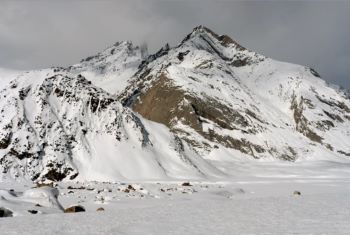Climate crisis - UN warns Caucasus glaciers are shrinking
- December 11, 2024
- Posted by: Elaine Coles
- Category: Environmental, Global, Water Issues, Asia

Climate change has caused glaciers in the Caucasus to retreat by an average of 600 metres over the past century, contributing to a loss of more than 11 billion tons of freshwater, according to the UN Environment Programme (UNEP).
The new Caucasus Environment Outlook (CEO-2) report, launched before COP 29 in November, reveals severe impacts on the region covering Armenia, Azerbaijan, and Georgia, as well as regions of the Islamic Republic of Iran, the Russian Federation and Türkiye.
The new report includes 20 maps to visualize environmental trends.
Water is increasingly becoming an unevenly distributed resource – river flows in most countries are expected to drop 20% by 2100. In 2020, river flow already plummeted 26% in Armenia and by 20% in Azerbaijan. Between 2000 and 2020, annual flow at the closing section of the Kura river — which spans Türkiye, Georgia and Azerbaijan —fell 20%. Furthermore, groundwater withdrawals have doubled in Armenia since 2000 and shot up by 400% in Azerbaijan.
With reduced snow and glacier cover in the mountains, the report’s authors expect freshwater supply to further substantially decrease in the coming decades, calling for innovative solutions and transboundary data sharing and monitoring.
While increased heatwaves are foreseen across the region, the number and duration of extremely hot days and heatwaves during the summer months in Azerbaijan is already significant. For example, air temperatures reached at least 35°C and above in the country’s capital, Baku, on a total of 86 days during 1960–1990. This figure rose to 365 days in total during the 1991–2020 period.
Average regional temperatures could rise by up to 3.6°C by 2100, exacerbating glacial melt and extreme weather events.
Glacier preservation is the theme of United Nations World Water Day 2025 on 22 March, the day after the first World Day for Glaciers and during the inaugural International Year of Glaciers’ Preservation.
The World Water Day 2025 campaign, co-coordinated by the World Meteorological Organization (WMO) and the United Nations Educational, Scientific and Cultural Organization (UNESCO) as part of a UN-Water Task Force, will focus on the plight of glaciers and call for more action to reduce greenhouse gas emissions and manage meltwater more sustainably for people and the planet.
River flows have already declined sharply, with Armenia seeing a 26 per cent drop in 2020, while groundwater withdrawals in Azerbaijan have surged by 400 per cent since 2000. Average regional temperatures could rise by up to 3.6°C by 2100, exacerbating glacial melt and extreme weather events.
Glacier preservation is the theme of United Nations World Water Day 2025 on 22 March, the day after the first World Day for Glaciers and during the inaugural International Year of Glaciers’ Preservation.
The World Water Day 2025 campaign, co-coordinated by the World Meteorological Organization (WMO) and the United Nations Educational, Scientific and Cultural Organization (UNESCO) as part of a UN-Water Task Force, will focus on the plight of glaciers and call for more action to reduce greenhouse gas emissions and manage meltwater more sustainably for people and the planet.
Click here to download the report Caucasus Environment Outlook (CEO-2)
